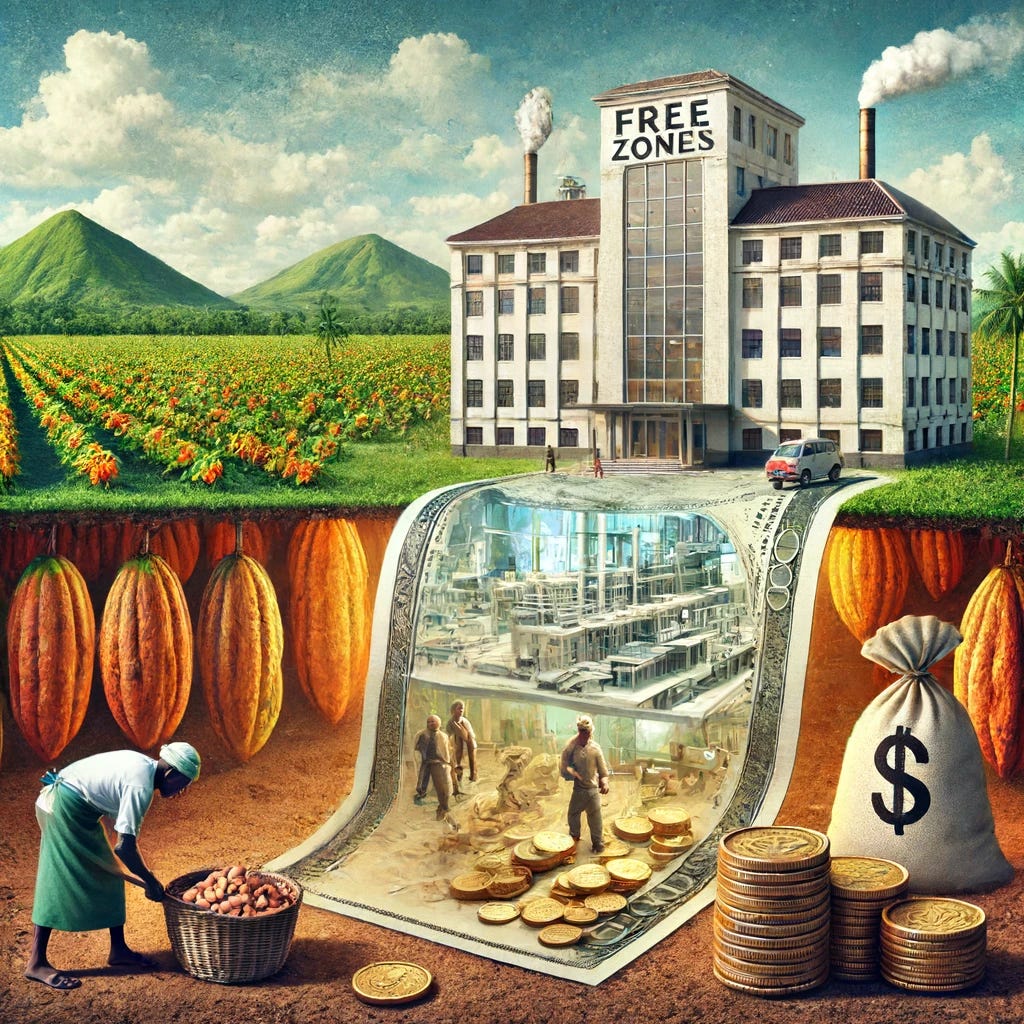The Illusion of Free Zones Contributing to Economic Growth in the Cocoa Sector
Who really benefits from Freezones!
Continuation from Part 2
The notion that Ghana’s Free Zones significantly contribute to economic growth is often an illusion. When evaluating economic performance through Gross Domestic Product (GDP), we must understand that GDP merely represents the dollar value of goods and services produced within a country. However, it does not necessarily reflect actual monetary benefits for the country’s economy.
GDP vs. Actual Economic Benefit
GDP as a Misleading Metric:
Dollar Value, Not Real Money: GDP calculates the total value of production within the country, but it doesn’t mean that the money generated from these activities stays within the country. In the case of Barry Callebaut, a leading cocoa processing company headquartered in Switzerland, the value of cocoa products processed in Ghana contributes to Ghana’s GDP. However, this contribution is superficial because the sales revenue does not enter Ghana’s financial system.
Sales Revenue and Foreign Exchange:
External Sales Transactions: The processed cocoa products are sold internationally, and the revenue from these sales is recorded in Barry Callebaut’s accounts outside Ghana. The trading and financial transactions associated with these products occur abroad, meaning that the money does not flow into Ghana’s bank accounts. Consequently, Ghana misses out on crucial foreign exchange earnings that could help stabilize and appreciate its currency.
Economic Impact of Revenue Staying in Ghana
Boosting Foreign Reserves:
Economic Stability: If the sales revenue from processed cocoa products were received into Ghanaian bank accounts, it would significantly boost Ghana’s foreign reserves. This influx of foreign currency would help strengthen the cedi, reduce inflation, and enhance economic stability.
Real Economic Growth:
True Economic Contribution: Real economic growth would be evident if the financial benefits of processing and exporting cocoa products remained in Ghana. This would include increased foreign exchange reserves, enhanced government revenue from taxes on sales, and improved funding for public services and infrastructure.
Automated Factories and Job Creation:
Employment Illusions: The idea that these factories significantly boost the economy through job creation is also misleading. Modern factories, including those of Barry Callebaut, are increasingly automated, reducing the need for manual labor. While some jobs are created, they are often low-paying and insufficient to claim substantial economic growth. The gradual shift towards automation further diminishes these employment opportunities.
Possible Question: Don’t GDP figures accurately reflect economic health? Counter Argument: While GDP provides a snapshot of production value, it does not account for where the financial benefits of this production go. In the case of Barry Callebaut, the actual economic benefit for Ghana is minimal because the revenue from cocoa product sales does not stay in the country.
The Role of Barry Callebaut and Economic Realities
Branch Operations vs. Independent Entities:
Local Operations as Branches: Barry Callebaut’s factory in Ghana operates as a branch of its global operations, not as an independent entity. This means that the profits and revenue generated from processing cocoa beans are consolidated at the headquarters in Switzerland, rather than being reinvested in the Ghanaian economy.
Keep reading with a 7-day free trial
Subscribe to Cocoa Diaries Newsletter to keep reading this post and get 7 days of free access to the full post archives.


